- Research
- Research Centers
- Journals
- Admission
- Introduction
- Programs
- Application
- Alumni & Giving
- Alumni Club
- Giving
An international seminar on Creating the Theory-Practice Nexus in Critical Thinking Instruction: A Multidisciplinary Dialogue was held online on Nov 26.
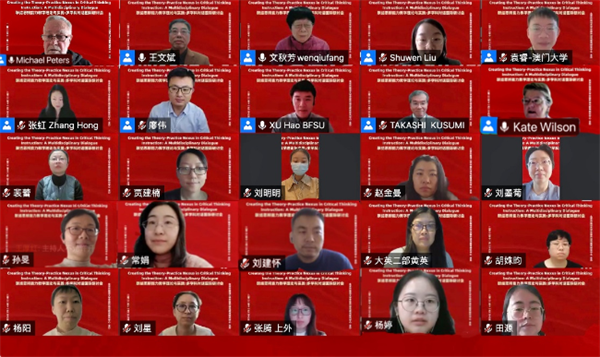
An international seminar on Creating the Theory-Practice Nexus in Critical Thinking Instruction: A Multidisciplinary Dialogue is held online on Nov 26. [Photo/bfsu.edu.cn]
Hosted by the National Research Centre for Foreign Language Education at Beijing Foreign Studies University (BFSU), the seminar attracted more than 200 experts and scholars to discuss the latest theoretical and practical achievements in critical thinking instruction from a multidisciplinary perspective.
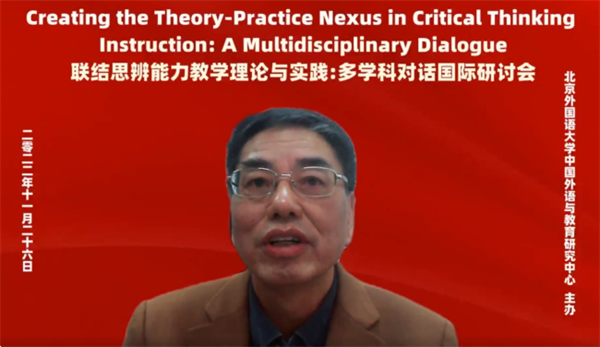
Wang Wenbin, director of the National Research Centre for Foreign Language Education at BFSU, addresses the opening ceremony of the seminar. [Photo/bfsu.edu.cn]
Wang Wenbin, director of the National Research Centre for Foreign Language Education at BFSU, extended a warm welcome and sincere thanks to experts and participants from all over the world at the opening ceremony of the seminar.
Wang spoke about the connotations of critical thinking, the prominent role it plays in foreign language education, the importance of critical theories, methods and multidisciplinary dialogues, as well as the applications of relevant theories in practice.
Wang stressed the responsibilities shouldered by the National Research Centre for Foreign Language Education, and encouraged professionals in foreign language education to contribute to building a world featuring openness, inclusiveness, peace and beauty.
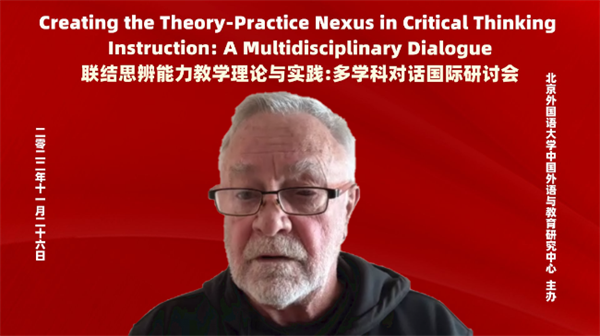
Michael Peters, a distinguished professor at BNU, emeritus professor at the University of Illinois at Urbana-Champaign, and senior research fellow at the University of Auckland, gives a report on “Critical Theory of Educational Practice”. [Photo/bfsu.edu.cn]
Michael Peters, a distinguished professor in the Faculty of Education at Beijing Normal University (BNU), looked back at the origins of critical theory.
Peters, also an emeritus professor at the University of Illinois at Urbana-Champaign and senior research fellow at the University of Auckland, introduced 10 practical theories, including the reflective practitioner proposed by Donald Schön and habitus defined by French sociologist Pierre Bourdieu, and pointed out the enlightenment of language-game, a philosophical term developed by Ludwig Wittgenstein, on foreign language teaching practice.
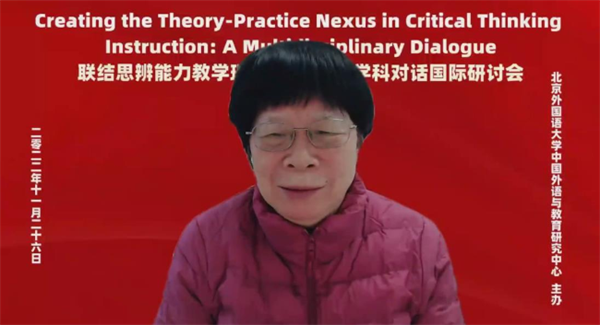
Wen Qiufang, a professor at BFSU, delivers a speech titled “Issues of Teaching Critical Thinking Skills in the Chinese EFL Context”. [Photo/bfsu.edu.cn]
Wen Qiufang, a professor at BFSU, reviewed the development of critical thinking instruction in China, and talked about the progress made in English-as-a-foreign-language (EFL) teaching in terms of critical thinking, the relationship between critical and higher-order thinking, the connections between thinking, standpoints and values, and ways to integrate higher-order thinking into EFL teaching.
EFL teaching should be integrated into China's stance and global perspectives to help students develop dialectical, systematic, creative and strategic thinking, Wen added.
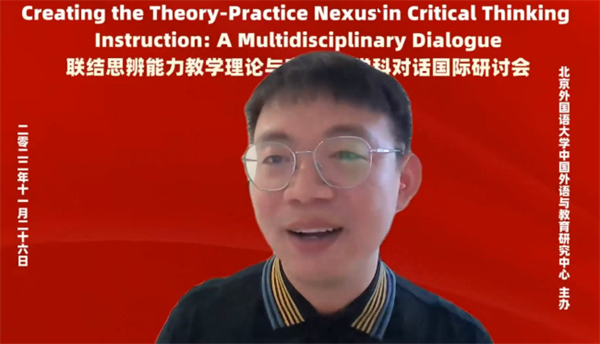
Yuan Rui, an associate professor at the UM, speaks on “How Do English-as-a-foreign-language (EFL) Teachers Perceive and Engage with Critical Thinking? Insights from a Systematic Review”. [Photo/bfsu.edu.cn]
Yuan Rui, an associate professor at the University of Macau (UM), reviewed 25 empirical studies on EFL teachers’ perceptions and engagement with critical thinking from 2010 to 2020, summarized their research methods and offered suggestions to promote future studies.
In his speech, Yuan elaborated on EFL teachers' understanding of critical thinking and relevant teaching skills, models and strategies of their critical thinking instruction, the impact of teaching on themselves as well as students and other factors influencing instruction.
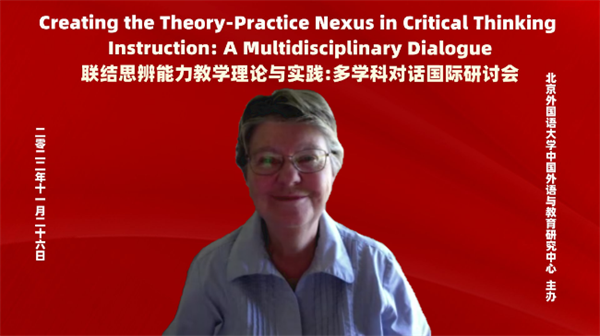
Kate Wilson, an adjunct associate professor at the UC, delivers a speech titled “Critical Thinking in ELT: Let’s Do it”. [Photo/bfsu.edu.cn]
Kate Wilson, an adjunct associate professor at the University of Canberra (UC), explained the concept of critical thinking, summarized its development in language teaching, and expounded on the cultivation of critical thinking skills in ELT based on Bloom's Taxonomy, a classification of the different objectives and skills that educators set for their students.
In view of the challenges faced by teachers in critical thinking instruction, she said that scholars could solve existing problems based on the achievements made in communicative language teaching and sociocultural theory.
Wilson also shared approaches on implementing critical thinking instruction in educational practice through illustrations and presentation of case studies.
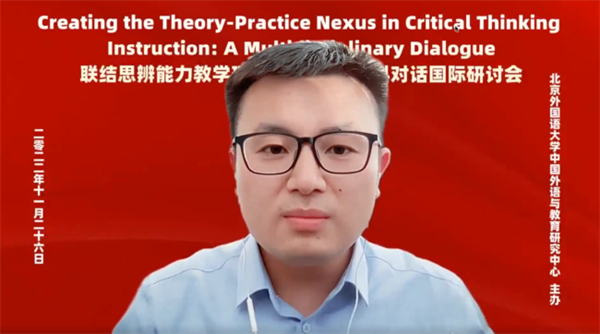
Liao Wei, a PhD student at BNU, gives a speech titled “Defining, Measuring, and Evaluating Teachers’ Critical Thinking: A Methodological Review”. [Photo/bfsu.edu.cn]
Liao Wei, a PhD student at BNU, shared his experience of a training program initiated by the Ministry of Education to cultivate educational talents, explained the significance of teachers’ critical thinking, unveiled the research findings of his team, and called on research fellows to broaden their horizons and think in big-picture terms in theoretical exploration.
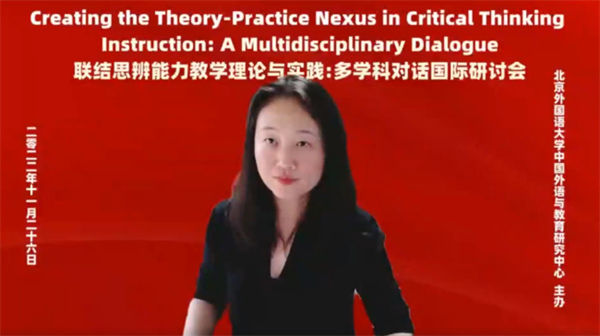
Zhang Hong, a professor at BFSU, makes a speech titled “Exploring University EFL Teachers’ Perceptions of Critical Thinking and Its Teaching”. [Photo/bfsu.edu.cn]
Zhang Hong, a professor at BFSU, explored the perceptions of university EFL teachers in China on critical thinking and its teaching through questionnaires and interviews.
According to her research, the teachers considered critical thinking as an important part of foreign language teaching, and they have nurtured students' critical thinking skills through questioning, discussing, debating, comparing and contrasting practice.
Integrating critical thinking into English curricula, textbooks and teaching is beneficial to the development of teachers and students, Zhang said. Yet the issue faces various challenges and needs further support, she added.
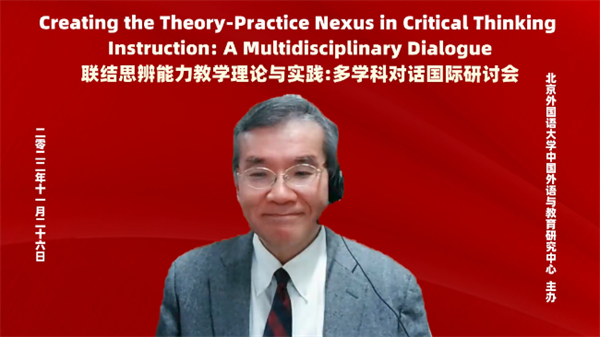
Takashi Kusumi, a professor at Kyoto University, delivers a report titled “The Cultivation of High School Students’ Critical Thinking Skills and Dispositions Through Educational Practices”. [Photo/bfsu.edu.cn]
Professor Takashi Kusumi from Kyoto University introduced educational reform in Japan and analyzed the improvement of students' critical thinking skills in a Super Science High School in Japan's Kansai region, which used a mixed approach to construct its curricula, and gave suggestions on further studies in the research field.